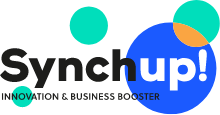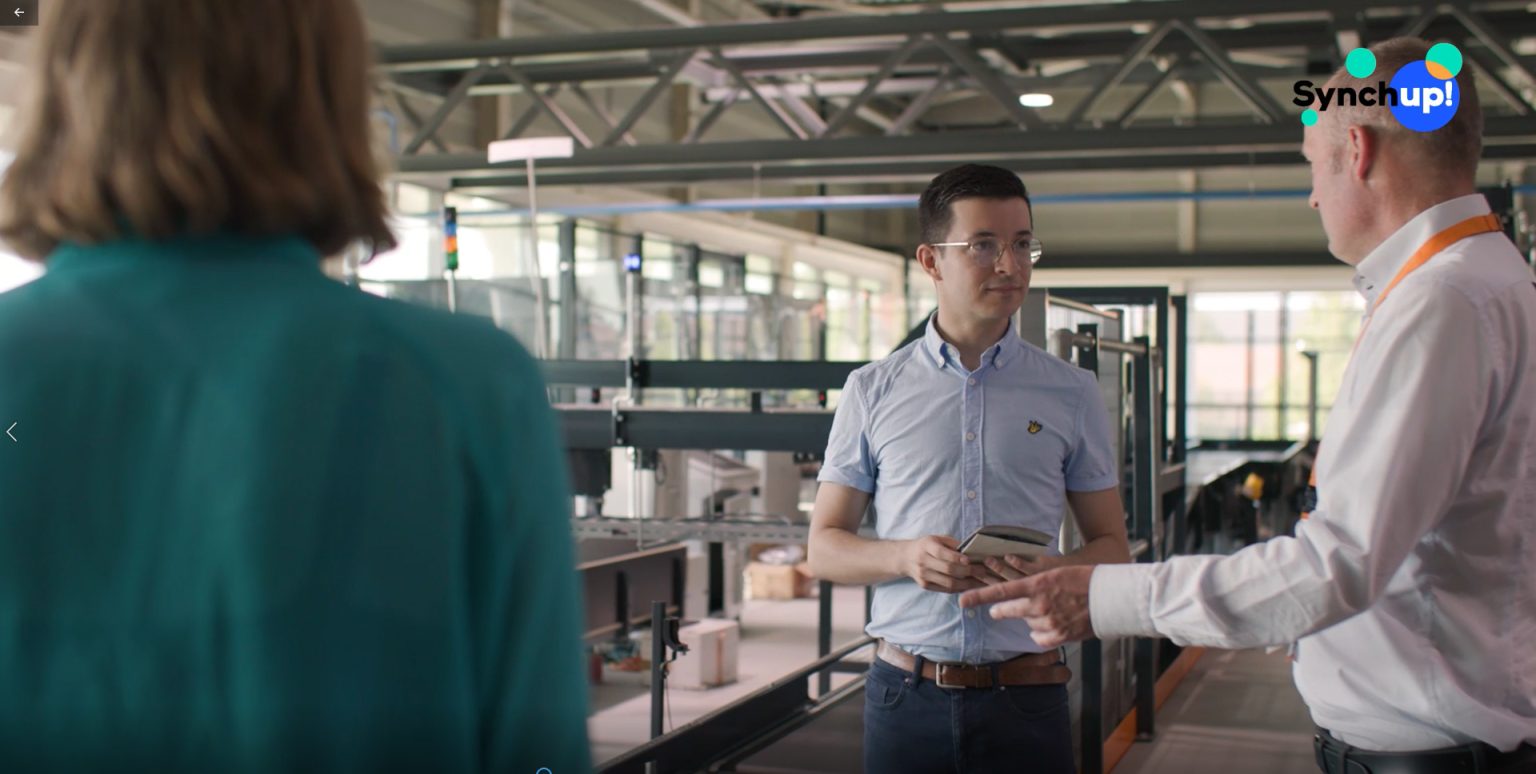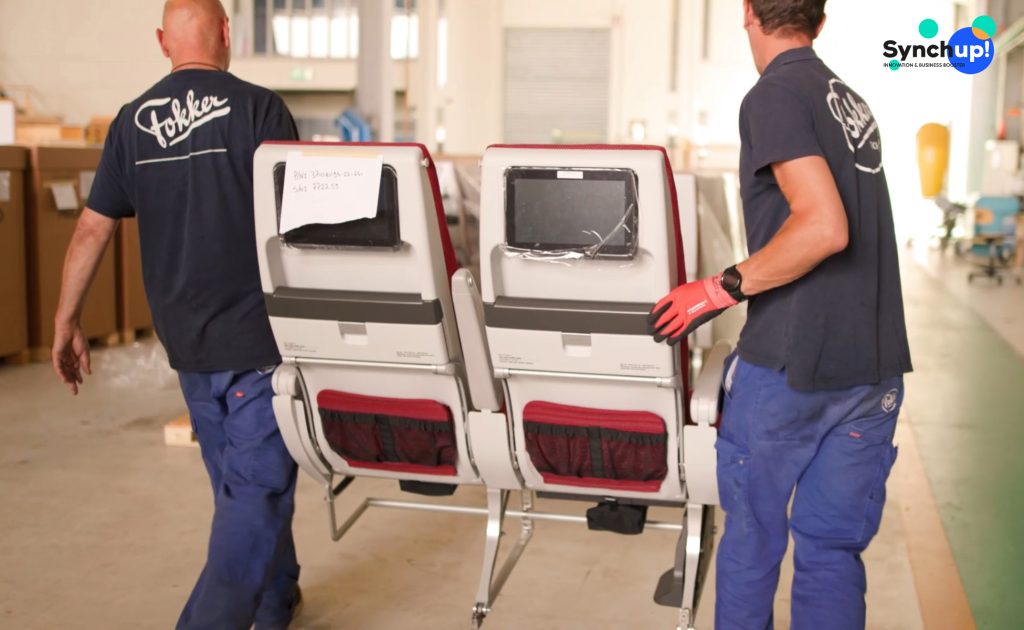“Without SynchUp!, we would probably not have found a mechanical solution.”
Veghel-based Vanderlande had long been looking for a way to recycle worn conveyor belts. Now it has found a solution thanks to the SynchUp! Development Programme. “Scouting companies that had a potential solution was crucial,” according to Vanderlande’s David Duque.
Vanderlande is a leading global partner for future-proof logistics process automation in the warehousing, airport and parcel sectors. This includes baggage handling systems for airports, which use conveyor belts made of polyester and PVC. David Duque: “Our aim is to recycle end-of-life conveyor belts instead of disposing of them. However, this is easier said than done, because the two main components are bonded and contain additives that are difficult to separate.”
The SynchUp! programme
More than a year ago, Vanderlande reached out to SynchUp!, REWIN West-Brabant’s programme for driving and accelerating innovation and business. The programme turns innovation issues that large companies face into so-called challenges, for which SMEs and startups can sign up. After creating a shortlist and meeting the teams behind the proposals, the challenger picks the best proposal. Challenge manager Freek van den Heuvel: “The SynchUp! team and scouts provide close guidance to maximise the chance that companies find a suitable match. Through our innovation vouchers, we also provide financial support to enable the challenge partners to start a pilot and develop solutions with real-world applications.” For this challenge, the SynchUp! team collaborated with the province of North Brabant, the Brabant Development Agency (BOM) and the Ministry of Economic Affairs.
Scouting the right company
The SynchUp! and Vanderlande teams first joined forces to arrive at a crystal clear problem definition. Then it was up to the scouting team led by Jan Westra of the Brabant Development Agency to find a company with the right solution. In their international scouting efforts, they worked with PNO consultants. The team reached out to 85 companies with the request so submit a pitch, which 8 companies ended up doing. After thoroughly analysing the proposals, Vinylrecycling.com of Lelystad was found to have the best solution. Jelle van der Werff of Vinylrecycling.com was elated by Vanderlande’s request. “It is not unusual for us to receive requests, but I have to admit that we are relatively new to PVC conveyor belts. We think we have the solution and look forward to testing it in a pilot later this year. We shred the material first, then grind it and then process it to separate it. The final step is where we add our ‘secret sauce’. We’re confident that it will work, but the quality of the residual material is the main unknown at this point. Still, the quality is a crucial factor for the business case.” Van den Heuvel: “The ultimate goal is to reuse the materials to produce new conveyor belts and create a closed loop.”
More volume needed
Jan Westra (Brabant Development Agency) guided Vanderlande and Vinylrecycling.com in the process and in drawing up the innovation contract: “My conversations with Jelle quickly revealed that Vinylrecycling.com would be able to recycle all Vanderlande belts worldwide in just a few days’ time. In other words: there was too little volume.” To increase volume, Westra reached out to Hanover-based Forbo Siegling, which manufactures many of Vanderlande’s conveyor belts. Westra: “Forbo also supplies other companies, of course, and could therefore significantly increase the volume available to Vinylrecycling.com.” Stefan Reusen of Forbo Siegling: “We feel responsible for our products and have multiple research programmes focusing on recycling. On top of that, we are also committed to using more sustainable or recycled materials at the front end of the manufacturing process. Yet, we face the same problem as Vanderlande: conveyor belts made of PVC and polyester are hard to recycle. Vinylrecycling.com’s solution is incredibly innovative, so we are delighted to be able to participate in the upcoming pilot.”
Innovation agreement
Talks between Vanderlande, Forbo Siegling, and Vinylrecycling.com led to an innovation agreement, with Vanderlande committing to supplying 2.5 tonnes of worn conveyor belts, while Forbo Siegling’s own production site will also supply 2.5 tonnes of conveyor belts. Westra: “In the pilot, Vinylrecycling.com will test whether it is capable of separating the belts properly, as well as measuring the quality of the PVC and polyester recyclate. After all, the quality of the material determines its potential applications.” Forbo Siegling may want to use the recycled materials to produce new conveyor belts, but that will depend on the quality, Reusen concludes.
Innovation voucher
In late May, Vinylrecycling.com was awarded a € 10,000 innovation voucher for the pilot by the SynchUp! programme. With the total cost of the pilot being just shy of €30,000, the voucher is a particularly valuable contribution. Van der Werff: “We opted for smaller scale testing to keep the costs down, but you still have to free up production slots and clean machines, which eats into your profits. And that’s before you add the costs of having the recyclate analysed by a third-party laboratory. All in all, we’re very grateful to SynchUp! for the financial contribution.”
Healthy business case
Duque: “If the pilot proves successful, we can start working on the follow-up. Can we come up with a healthy business case? Could and should Vinylrecycling.com develop a new recycling line?” Westra: “The quality of the polyester recyclate and its potential applications are still a big unknown. Besides, we still have to figure out how to set up the logistics of the belt return process and work out whether our plans are environmentally sound. Finally, none of this works if the business case does not check out.”
Regional and global impact
Westra: “Vanderlande initially thought that a chemical approach would most likely yield a suitable solution. Without SynchUp!, we would probably not have found a mechanical solution.” Duque: “Working with a dedicated agency made all the difference. We do not specialise in scouting new partners and have little knowledge of the recycling industry.” SynchUp! is fundamentally a Brabant-based programme. Westra: “Admittedly, Vinylrecycling and Forbo Siegling are not situated in SynchUp!’s home region, but the world is bigger than Brabant. With these partners, we believe we can offer a successful solution to Brabant-based Vanderlande and strengthen its position. Ultimately, the impact of the solution will be regional, with the environmental impact even being felt on a global scale.”
Duque, in conclusion: “The collaboration with SynchUp! was as smooth as can be. Jan Westra and Freek van den Heuvel did much of the heavy lifting and introduced the various partners. The fact that we have come far enough to start testing is already incredibly valuable.”
Vanderlande’s SynchUp! challenge was made possible by a financial contribution from the Province of North Brabant and the Ministry of Economic Affairs.





